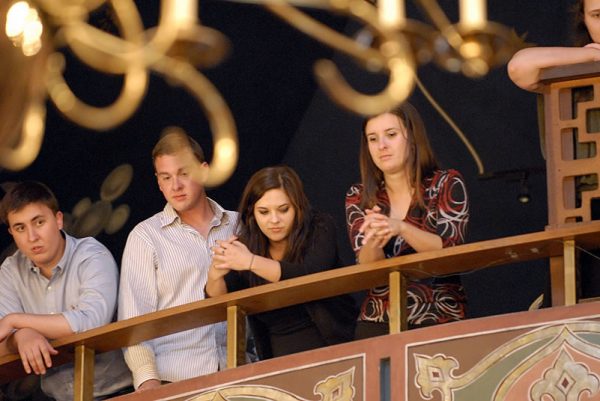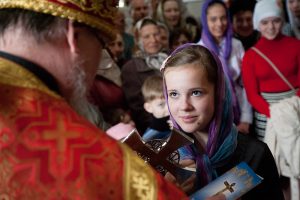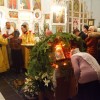What will become of my children? Every responsible parent asks this question at some point as their children grow older. We want our children to grow up safe and free, as healthy as possible in body, mind and spirit and to make the best use of their God-given gifts. If we are Orthodox Christians we also want our children to come to know Christ personally and in the Church. We know that the Church is the ark of salvation and that the spiritual safety of our children therefore depends on their remaining in the Church through all the stages of life from the cradle to the grave. What we may not know as Orthodox Christians is that here and there, but not everywhere, we are failing our children.
That seems quite shocking, and it is, but it is nonetheless true. A whole generation or more is being lost to the Church and the root of this problem can be traced way back to infancy in churchgoing families. Going back further than one generation reveals a longer term and growing problem, a problem of unchurched adults whose children will show little prospect of finding salvation because they see in their parents a lack of concern for their own. Some of these issues faced by the Orthodox Church are shared with other Christian churches and mainly concern the secularising forces of our post-Christian culture. In this article I do not intend to deal with these issues but rather with those special matters of concern in the Orthodox Church with reference to the younger children of churchgoing parents. When these children grow into their teens, and certainly when they leave home, they are being lost to the Church. Why is this so?
Growing up as a Christian in the British Isles and Ireland in the 21st century is a testing time for many young people. Until 2007 I taught Religious Education to 11 to 16-year-olds in both Church schools (Roman Catholic and Anglican) and State schools. In the Church schools, and even in predominantly Christian areas, the average number of young people with any contact with any church rarely exceeded 6 out of a class of 30. Of those, perhaps only two or three would have any commitment to Christ and that commitment would be quite fragile. Among their school friends, attitudes to Christianity would vary from puzzlement through derision to outright hostility. A young Christian person’s faith needed to be quite strong and reasonably well-informed. Their character had also to be quite robust and independent to withstand the mocking of their friends.
If you are reading this and you are an Orthodox Christian parent having settled here in the British Isles and Ireland over the last 20 years or more, you may be quite shocked by my account. You may be aware of the hostility to Christianity, or at best the incomprehension of it among your adult non-religious friends but for your children, well-being and happiness at school will probably involve a desperate desire to keep their churchgoing secret from their friends. The long-term effect of this social pressure and the relentless attacks on Christianity in society eventually take their toll spiritually on young lives.
Imagine now that as Orthodox Christian parents you are insisting that your children catch your own faith in Church in a language other than English. Of course, many children of Orthodox Christian families recently settled here are bilingual and so you may think that there is no harm in using a language other than English in the services or in Christian teaching. Your children understand, as you do, so where’s the harm? Well, I suppose there is no harm if you are only going to live here for a few years and that you then intend as a family to move back to your country of origin. However, many Orthodox Christian families do not find themselves in this position or indeed do not intend to leave this country. They anticipate that they will be living here for the long term or maybe their short-term goals of return are unrealistic. What then? What message does a refusal to use English in church give to young people, particularly as they enter their teenage years?
Difficult and painful though this might be to accept, the message you are giving to your children is that this Christian faith, this Orthodox Christian faith, is indelibly linked to the country in which you grew up. This robs your children of the possibility of connecting to Christ through Orthodoxy directly in and through the indigenous culture and language of these Isles. Your children’s Muslim, Hindu, Jewish, Sikh, Buddhist, atheist and agnostic friends, with whom they socialise on a daily basis at school if nowhere else, will share similar backgrounds, situations and challenges. Religious sentiments, insofar as they are respected at all in this wider youth subculture, will be identified as what mum and dad do when they seek in their religious practice to revert to forms familiar from their own youth in the ‘homeland’. As such this faith will seem increasingly very distant to them as their social environment and personal identity draws them away from their childhood experience in the Church. Into adulthood they are much less likely to go to Church on a regular basis and by the time they have children of their own a second generation will be well on its way to being lost. Of course, some will be picked up by Protestant and evangelical sects and I suppose that this is better than falling off the spiritual map entirely; but what do we really think we are doing when, as Orthodox Christians, we not only accept this situation but also consciously decide to do things that make it more likely to happen? Mistakenly, perhaps, we think that if only our children can be kept in a sort of Orthodox “bubble” where the language, culture and expression of faith is so far removed from that outside the walls of the church, then all will be well. It is precisely this attitude, however, that causes the problem in the first place and yet we do not see it! Why do we not see it? I believe that there are two main reasons.
The first reason has more apparent religious respectability to it as an argument, but actually it is heretical. This is the idea that Britain, lacking a decent Orthodox Christian culture, (which certainly cannot be contested), is actually a danger zone from which our children must, at all costs, be protected. The argument goes that the only way of protecting them is to keep them in the Orthodox Bubble with its self-contained language and culture from the homeland. In some jurisdictions, even communities with predominantly indigenous converts are pressured by hierarchs to create their own ersatz Orthodox bubble and this has the extraordinary effect of some UK born citizens adopting an alternative pretend persona as pseudo-Greeks, Russians, Romanians, Arabs etc. However, this reason for creating an Orthodox bubble is heretical not only because it is a betrayal of the equality of all nations as God’s creation but it is also a betrayal of hope that the gospel is indeed for all nations and all cultures. As Orthodox Christians we are obliged – it is not a choice, it is a command of the gospel itself – we are obliged to communicate and live out the gospel in the society, culture and indigenous language in which we live. To imply that this is not possible is to reduce the Church to being a museum or protectorate of certain privileged cultures and languages deemed to be safely Orthodox in contrast and opposition to others deemed to be incapable of becoming Orthodox Christian. If that were true, St Paul would have never taken the gospel to the Gentiles and the Church would have remained a Jewish sect, initially confined to the Middle East and then dispersed as the Jews have been throughout the centuries to this day. When speaking of my own jurisdiction (Antioch), if anyone in this Church subscribed to such horrendous views then this would constitute a gross betrayal of the foundation of the Antiochian Church in apostolic times when this Church became the first base ‘par excellence’ of that mission to the Gentiles commanded by God himself.
The second reason for the inability of some Orthodox to understand their own complicity in losing generations of young people to the heterodox or secularity concerns something pastoral and psychological. This often exists alongside the first reason as a disguised primary motivation and it concerns a bereavement. Now this might strike you as somewhat strange, since we normally associate grief with the loss of a loved one, the breakup of a relationship or the loss of a job. There is however another grief, a cultural one and an aspect of one’s personal identity and nationality. This grief occurs often in the first generation of immigrant families and because the clergy who minister to these families often share the same sense of dislocation and bereavement in the loss of a homeland, the grieving process becomes stuck and people find it very difficult to adapt and to feel at home in their new country of residence. In these circumstances, the Church can provide a little relief from this distress when, for a time every week, the community can suppose (inside the Orthodox Bubble) that it is still in the homeland with its accustomed culture, language and customs. This dysfunctional response can be reinforced by the more negative aspects of multiculturalism which suppose that the best way to ensure diversity is to encourage the maintenance of lots of little bubbles of culture and language, religious and non-religious, whereas in fact, diversity only works well when those languages and culture are shared and fed into national life. However, as far as the life of the Church is concerned, this unresolved bereavement, this dislocation of cultural identity, explains the fierce resistance exhibited by some Orthodox communities, to any process of indigenisation within Church life. The most disastrous aspect of this is the refusal to use the English language in worship and teaching which is the only guarantee that our young people will be sufficiently equipped through understanding the faith in order to practice it and witness to Christ through it.
At this point in the article is it important to refer back to my earlier comments about why it is that Orthodox teens so easily fall away from Church. It is not, of course, the case that an overnight switch to the use of English in our services will somehow ‘magic’ these teens and young adults back into the Church and prevent the long-term decline that we are now seeing. However, it might just help to prevent a third generation going the same way if we take prompt action now. We may not see the benefit for at least 10 years but within that same period and without this prompt action the losses to our membership among the young will only continue to accelerate.
This article, therefore, is a no holds barred, blunt warning and call to action to those Orthodox Christian communities who think that keeping things as they are in the Orthodox Bubble is in any way a viable option for the Church into the future. It is not. Failure to act now, before it is too late, will leave our children outside the Church as they grow up and condemn Orthodoxy in the West to a slow and lingering death. Any Orthodox happy to stay in their comfort zones on this basis are complicit through their inaction and unwillingness to adapt with a betrayal of the very gospel itself and as such they will be judged. When therefore we ask: “what will become of our children?” let us be sure that we respond with positive strategies aimed at keeping them in the Church so that through their witness and ours this nation may be won again for Christ. Since the Ascension of our Lord this call to teach, baptise and make disciples among all nations has been and always will remain our joyful duty until Christ comes again. If we don’t start by discharging our duty to our own children, what chance is there that we will come anywhere close to fulfilling the Great Commission?





















